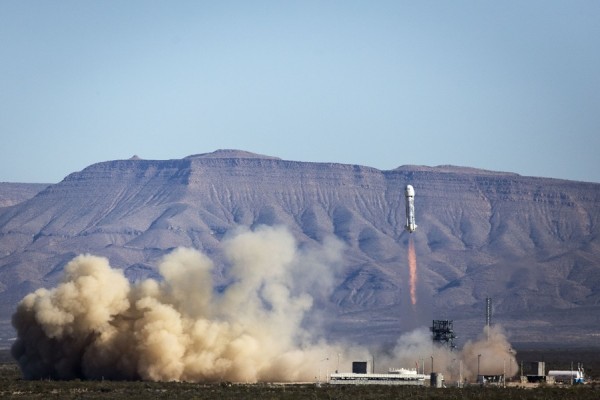By Ana Verayo, | April 03, 2016

The reusable New Shepard space vehicle ascends through clear skies to an apogee of 339,138 feet.
Amazon's Jeff Bezos and his private space company, Blue Origin, have successfully launched and conducted a vertical landing of his new rocket, for the third time. This suborbital rocket has the capability to carry six astronauts or space tourists, which could make the company ahead of the pack in the development of reusable rockets.
Like Us on Facebook
On Saturday, the New Shepard rocket that was carrying a small space capsule that blasted off from a West Texas launch site during an undisclosed time. Shortly after some minutes, the rocket returned and landed back to the pad, according to Blue Origin officials. The capsule was also in flight during autonomous mode, which then landed on a nearby site via parachute upon recovery.
Blue Origin does not announce its test flights and results but only after completion, where Bezos adds that he will release a video of the successful test flight after processing.
On Twitter, Bezos congratulated the team and said it was a perfect booster landing and a flawless BE-3 restart. While Blue Origin has yet to comment on this third successful attempt for a rocket launch test, the company said on Twitter, Congrats, Blue team on today's flight!
This successful launch, flight and landing for the new rocket is not only successful but it has been for the third time, beginning from missions completed in January and November.
Saturday's launch was also slightly different as the New Shepard's BE-3 engines only restarted closer to the ground some 3,600 feet. which means that anything can go wrong and the booster might not make it in time for a vertical landing. Apart from this, the rocket is also carrying microgravity experiments from the Southwest Research Institute and the University of Central Florida that was released in lower Earth orbit.
During traditional rocket launches, the first stage of the rocket is discarded, re-entering and burning in the Earth's atmosphere after launching a spacecraft or a cargo capsule into lower Earth orbit. Now, two private space companies, Blue Origin and SpaceX are in the race to reduce these expensive costs by developing reusable rockets. However, the New Shepard rocket can only take humans in suborbital space at a height of a little over 62 miles.
Earlier this month, Bezos announced that Blue Origin will begin crewed test flights for the New Shepard next year where paying space tourists can begin flying by 2018. But for now, Blue Origin can only fly suborbital rockets since it lacks speed and power to place spacecraft into lower Earth orbit.
-
Use of Coronavirus Pandemic Drones Raises Privacy Concerns: Drones Spread Fear, Local Officials Say

-
Coronavirus Hampers The Delivery Of Lockheed Martin F-35 Stealth Fighters For 2020

-
Instagram Speeds Up Plans to Add Account Memorialization Feature Due to COVID-19 Deaths

-
NASA: Perseverance Plans to Bring 'Mars Rock' to Earth in 2031

-
600 Dead And 3,000 In The Hospital as Iranians Believed Drinking High-Concentrations of Alcohol Can Cure The Coronavirus

-
600 Dead And 3,000 In The Hospital as Iranians Believed Drinking High-Concentrations of Alcohol Can Cure The Coronavirus

-
COVID-19: Doctors, Nurses Use Virtual Reality to Learn New Skills in Treating Coronavirus Patients







